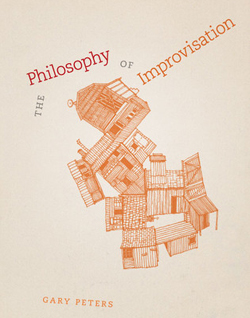GARY PETERS

interview by Daniel Barbiero
(April 2018)
Taking a philosophical view of improvisation is something Gary Peters has been doing at least since his writing of the book The Philosophy of Improvisation, published in 2009. More recently, he's published Improvising Improvisation, a consideration of improvisation from within the tradition of Continental philosophy, beginning with Kant and Hegel and informed more recently by the work of Derrida, Deleuze and Badiou. This latest book isn't only about improvisation; it was itself improvised—"written each and every day from scratch," as he described it. It may be an unusual way to write a book of philosophy issued by an academic publisher, but improvisation is something Peters is well-acquainted with: in addition to being chair of philosophy and performance at York St. John University in York, England, he is himself an improvising musician, an accomplished multi-instrumentalist who has been active in genres as different as avant-garde jazz and Country & Western.
During late winter he and I discussed some of the philosophical issues pertinent to improvisation via transatlantic emails.
PSF: Books about improvisation--both the theory and practice of it--have recently been appearing in some number. There seems to be a real interest in going beyond the description of examples and genres and toward something else--a reflection on what it is to improvise, with all that that implies in terms of the experience, purpose and the existential dimension of it.
GP: I should start by confessing that I don't find the question-answer form of dialogue all that attractive, and can rarely think of anything very interesting to say as a response. I think this is evident in my writing on improvisation which (while not anti) tries to avoid dialogism as much as possible. Like Deleuze, when someone says 'let's discuss' X, I run for cover.
Another confession: I almost never read books on improvisation; so while I am aware that there seems to be something of an upturn in their numbers, I have little or no idea as to the content of these ever-proliferating books. With all of the interest now in Tim Ingold's anthropological notion of improvisation which, of course, overlaps with the existential concerns that you mention, no doubt this is something that is taking such texts beyond the analysis, interpretation, celebration and instruction of/in improvisation that characterizes so many of the books on such practices (the ones I have read or part-read anyway).
For my own part, I've never been particularly interested in the existential, something that has always pushed my own thinking and writing (and improvising for that matter) in the direction of what might be called (rather grandly) the ontological or the Evental. For me, Heidegger's famous critique of humanism and existentialism (and, of course, Sartre) still holds my attention, hence his constant presence in my work (although my writing could hardly be described as 'Heideggerian,' whatever that might mean).
In some ways, the new emphasis on 'life' as an endless creative process (much influenced by Nietzsche, Whitehead, Bergson, Deleuze and now Ingold) seems to be a new version of the emancipatory perspective that has been so evident in the discourses around improvisation. This is all great, but I'm not sure that it covers all aspects of improvisation, or life for that matter.
Where Deleuze (rather than 'the Deleuzians') has been such an inspiration for me is in his recognition of the Event of creativity (translated into improvisation by me on occasions), something that we do not create, but something that we encounter, or sense, or contract through habit. Influenced by this, Catherine Malabou's discussion of 'being's improvisations' as opposed to us being improvisatory raises the issue of passive creativity, one that I'm still thinking about. To the extent that the existential is the subjective experience of this passivity in the face of the Event of Being (to bring Deleuze and Heidegger together), then I can see a place for such an existential approach, but I fear that is not the way such texts are likely to go: maybe I should read some and find out.
PSF: Before you do though, I'm curious to know what, in musical terms, it means to translate the Event of creativity into improvisation?
GP: Yes, I would be curious to know that too. Actually I was using the term 'translation' very loosely just to make the simple point that, given the attention Deleuze gives to creativity while largely ignoring the issue of improvisation, I have often appropriated his ideas 'as if' they were referring to improvisation: that, if nothing else, has given me a few things to work with. In a recent (and very damning) review of my new book, a very 'helpful' Deleuzian philosopher has pointed out to me that what I have failed to grasp is that Deleuze doesn't need to discuss improvisation precisely because his thinking is improvisational through and through. If that were the case (which I seriously doubt), the translation of his thinking on creativity into my own thinking on improvisation would be a piece of cake. In fact, what really interests me about Deleuze is precisely that he is not a particularly improvisatory thinker, something that makes the translation of his thinking into my own much more problematical.
Remembering (rather dimly) Walter Benjamin's very beautiful The Task of the Translator essay, I'm thinking more of the 'pure language' he evokes, outside of the plurality of different languages, something close to the Event of language that the translator must show fidelity to (using Badiou's more recent terminology).
So, to answer your question: to 'translate the Event of creativity into improvisation' is not something I would ever attempt to do 'in musical terms' (as you put it), which is why I devote so much of my time writing about that which takes place before/after/outside of actual performances: the vanishing moment of improvisation. When Deleuze speaks of 'the creative act,' he in no way intends to speak of creation which, for him, is 'something very solitary.' No, what he is concerned with is the 'more profound question that gnaws away' at those who create: the Evental question of 'what are we?' Translating this into my own (not necessarily musical) terms, the reason why I improvised a book on improvisation was not a cheap gimmick but, rather, an attempt to pose that same question: 'what are we improvisers?' Not, 'what is improvisation?' Or, 'how can we improvise better?' Or even 'what's going on in this or that improvised performance?' And especially not, 'who are we?' (existentialism again): but, 'what are we?' Obviously, I still don't have a satisfactory answer to that one.
PSF: Well, you certainly aren't alone in that regard! But it does seem to take us back to the ontological perspective--it's to ask, or if you prefer, "as if" to ask, 'What kind of being are we that improvisation is possible in the first place?' Not a musical question, but one that music, as an exemplary phenomenon, might provide an opening to?
GP: I think your question is framed in such a way that we are immediately drawn back into the existential, into 'what kinds of beings are we that have the possibility to improvise' rather than 'what kind of Being is it that improvises?' What I have found so fascinating and challenging when trying to read Deleuze's Repetition and Difference is his rejection of the whole concept of possibility and the obsession with realizing possibilities (so ubiquitous in the discourses surrounding improvisation). Replacing this language with the idea that it is the virtual that needs to be actualized rather than realized precisely because the virtual is already real, he concentrates on necessity rather than possibility which, of course, sounds a whole lot less emancipatory than the usual improv terminology. I have always considered improvisation as a predicament rather than a skill or an approach or a life-choice or whatever. While there are lots of things we can do or choose to allow us the possibility of becoming improvisers within specific situations, it is the prior necessity or (Heidegger would say) 'decisiveness' of improvisation as an unowned/unchosen Event that is the issue for me.
Long ago, I wrote my PhD on irony, and one of the great German romantic ironists, Friedrich Schlegel, had a great definition of irony: the 'impossibility and yet necessity of full communication,' which resonates with your earlier question about translation. Schlegel's irony is also echoed in Beckett's famous reflections on the impossibility of and yet necessity to express something: the 'I can't go on, I'll go on' moment. It is this predicament, when nothing is possible and yet everything is still necessary, that my last book began to grope towards.
PSF: In your book on the philosophy of improvisation you characterize improvisation as being primarily about producing beginnings rather than works. If that's the case, then wouldn't that constitute a predicament of its own for improvisation--that in order perpetually to produce beginnings, one must constantly forget the beginning that brought us to this moment and somehow begin again?
GP: As you may have noticed (or not), I quite often reference the writings of Keith Johnstone, who in one of his books describes the improviser as follows: 'The improviser has to be like a man walking backwards. He sees where he has been, but he pays no attention to the future.' This certainly captures something of the improvisational process, where it is the rapid-fire response to what has just happened that keeps things moving forward. But the idea that such backward-looking improvisation 'pays no attention to the future' seems to me to be at least partially mistaken. Using Husserl's phenomenological terminology, there is more to walking (and I would add, looking/listening) backwards than the immediate 'retention' of past moments in the continuous flow of time-consciousness; just as there is more to it than (to continue with Husserl's vocabulary) the 'recollection' of past moments in an interrupted/discontinuous experience of time.
What both of these related perspectives have in common is that, while the immediate past (retained) is connected to the present as a kind of 'comet's tail,' the more distant past can also (it is assumed) be brought back to the present (re-collected) as that which has been or can be 'fulfilled' in a past present or in the present present; to link this to your question: that which 'brought us to this moment.' My fascination with beginnings (actually I'm over it now, like most other things) relates to the manner in which (in its 'free-est' forms) improvisation (in the absence of scores, charts, instructions, etc.) highlights, problematizes and dramatizes the moment of beginning.
In this predicament (as your question rightly observes), looking backwards is a remembering of past beginnings. The difference is that, unlike 'retentions' and 'recollections,' memories are not necessarily fulfilled in the present, and it is precisely this fact (to go back to Johnstone) that requires us to 'pay attention to the future:' the past future of previous beginnings, the memory of unfulfilled hopes. Yes, you're right, we do need to constantly forget the beginnings that brought us to this moment (a kind of Nietzschean 'active forgetting'), but as with Nietzsche, such forgetting must serve a new way of facing the past (he would say a more 'powerful' or 'willful' one) one that remembers beginnings that did not bring us to this moment but which cast, through 'hope,' our minds out into the still unfulfilled future of such beginnings. Deleuze sees this emptying of the present as the essence of the Event (always past or yet to come, never present); Adorno sees it as the infinitely unattainable promesse de Bonheur of all art--although, of course, he would exclude improvisation from that category!!

Gary Peters' The Philosophy of Improvisation is available from the University of Chicago Press